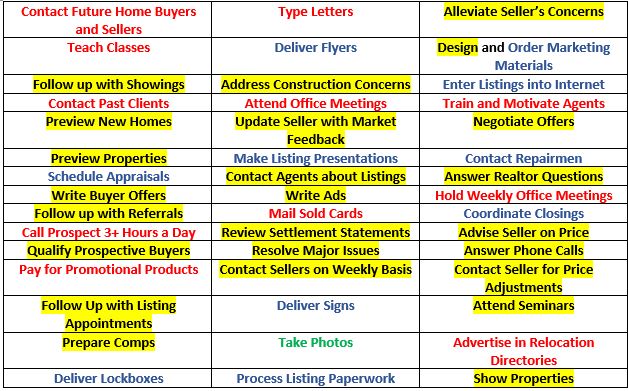There are essentially two types of real estate agents – Transactional and Relational
A Transactional agent leverages everything so that their only activity is lead generation and working ON their business, not IN it. Most real estate TEAMS fall into this category. They focus on Quantity.
A Relational agent still leverages, but only the administrative work. They spend more of their time with clients and actively working deals and spend very little time lead generating because they have more than enough business from repeat and referral business. They focus on Quality.
Lets talk about the Transactional agents, more specifically the teams. They have been rising in popularity since 2004 when a very prominent real estate figure wrote a book about how real estate agents could become millionaires. Most of the book is about how agents can leverage themselves to make the most money by forming a team. In fact, the book is broken down into stages with a very detailed roadmap from thinking about a million to earning and netting a million. It is considered to be the blueprint for “success” for many top teams. The team business model is all about the team leader getting all the money while convincing the public that their team members are better than other Realtors. They do this with carefully rehearsed scripts, half truths (and frequently down right lies), and massive lead generation (leads for their business, not leads for their listings!). It’s a classic bait and switch. You think you’re hiring the team leader, but you’re not. But they will convince you with their scripts that it’s their “systems” that are better than their competitors. Clink on the links or just google real estate scripts – it’s pretty sick manipulation of the consumer if you ask me (you’ll notice a vast majority of them are published by the same company that published the book about real estates becoming millionaires!).
Typically, these teams start with a great agent who ends up with more business than they can handle. They take on agents underneath them so they can focus on “money making activities.” That’s when they become the “Rainmaker” and stop handling any of the day to day business. Many of them start “coaching” other agents. They no longer actually sell real estate themselves. They essentially become a brokerage, without officially being one, AND WITHOUT BROKER’S LICENSES! This confuses a lot of consumers!

“The Rainmaker”
Many quote the production of the entire team when going up against a single agent. It seems impressive at a quick glance but if the XYZ team sold $60,000,000 last year with 10 licensed agents, is that actually better than the single agent who sold $15,000,000? Those teams also frequently tout the experience of the Rainmaker when he’s not actually involved in the transactions. Some even add up all the years of experience! Do you really think that a team who is all about delegation has all agents putting their heads together on each deal? Probably not. Deceptive? Absolutely. A team I deal with freuently just added a second dedicated listing agent. While I was on the phone with listing agent #1, I asked about a couple of the teams other listings I heard were coming up. Her response, “I have no idea, those are XXX’s listings. Do you have her number?”
So who are these agents who would want to work under a Rainmaker? Remember that the whole purpose of the team concept is for the person at the top to make more money. You can bet they are taking a big cut of that agent’s commissions. Who would take that job? Not someone good enough to do it on their own, that’s for sure. Most team members are agents who are new to the business, new to the area, part time, or just lack the confidence and/or skill to do it on their own.
A favorite tagline of these teams is “There’s no way a single agent can deliver the same service as a team!” Look at the example above with the single agent selling $15,000,000 a year. That agent is a Relational agent, focusing on quality. They leverage the administrative work, focusing on the selling, contracts, marketing details, continuing education/mastery, and networking, averaging $1.25 million a month. They spend their time focused on their clients, which generates referrals for future business. They don’t have to spend time lead generating or managing a business.
A team in my market uses an infographic in their marketing that says, “Selling a house entails”…..”There is no way to do this at a high level alone” Here is a list of what’s between those statements.

I can see how this would be convincing, however, lets break these down:
RED items – business building activities and activities that are specific to HAVING A TEAM that have nothing to do with selling homes.
BLUE items – administrative items that are delegated by most top producing single Relational agents to an assistant.
GREEN items – these are done by 3rd party vendors
Highlighted items – Of the 45 tasks listed, these 24 are the duties that actually have to do with selling a home and are done by the agent. These are all very important tasks that should ONLY be done by the skilled agent. But as you can see, it is absolutely possible to do these things at a “high level alone” when you take out all of the “fluff.”
Last but not least on the subject of teams. Teams like to talk about how they are more efficient because they delegate. They treat the home selling process like an

assembly line. They have different people who work with buyers, someone else who handles sellers, another who calls for the feedback, someone else who takes the phone calls, and sometimes another person who negotiates the contracts, etc… The problem with this is that these are not car parts. When you make a car, the engine doesn’t have to know anything about the brakes in order to perform it’s function. Specialization and the assembly line concept works on car parts – not so much in real estate. Here are a few examples:
- A listing agent who reads all buyer feedback is going to have a better understanding of what buyers are looking for, which will in turn help them price more accurately.
- An agent who only works with buyers is not going to understand how sellers think, and will be much less effective negotiating against them.
- Conversely, an agent who only works with sellers is not going to understand how buyers think and will be less effective negotiating against them.
- A person who takes all incoming calls but doesn’t sell isn’t probably the best FIRST point of contact for someone calling on a listing.
- And most importantly, a dedicated listing agent handling 20+ listing is doing two things – sitting at a desk servicing listings and going on lising appointments. They are NOT looking at property! They don’t have time. They are pricing your home based ONLY on the photos they see in the MLS. Those are marketing photos! Meant to highlight the best features. That agent has no idea what the properties are like. This is why they have so many price reductions! A lot of these teams like to build their price reductions into the listing contract. This should be a huge red flag. A team I encounter frequently has a pretty well known set schedule for requesting price reductions. It has nothing to do with reading the market, and everything to do with their business model and keeping things moving through their pipeline. Their price reduction schedule is so predictable, most agents I know tell their buyers to wait a few days because they know a reduction is coming. And I always see mutiple price reductions by the team on the same day. They actually call is “dialing for dollars” when they sit down to call all of their sellers for reductions!
Keep in mind that individual agents can be also be Transactional agents. And, smaller teams (most commonly just a partnerships) can also be Relational. Now that you understand the difference, you can decide what type of agent you will work best with and who you think is more likely to get the best results for you.
You should NEVER just talk to one agent prior to listing your home.
Here are some great questions to ask the agents
you are considering to list your home:
- How long have you been a licensed real estate agent AND working full time, selling a minimum of 1 home a month?
Be sure to ask like this. Understand that newer agents try to get around this question by saying how long they have been “in real estate.” I know an agent who has been licensed and practicing for only 2 years but says she’s been “in the business for 20 years” because she has been married to an agent and did home staging. Also, beware of people who say thigs like, “I have been in sales, management, design, etc… for 20 years, just now transitioning to real estate.” Selling software is not selling real estate. Real estate is not a commodity, there are emotions involved, selling to people is different than business to business, there are very important legalities, etc…
- Here is where you can check on an agent’s license status

- In Texas, license numbers are issued in order. I was licensed in Texas in January 2007 and my license number is 566438. Licenses issued in 2016 start with 665, so the lower the number the longer they have been licensed.
- The Texas Real Estate Commission (TREC) just made it even easier to find out how long an agent has been licensed! When you go to their website and put in the agent’s name, now there is a button next to their name that says “print license history.” Click it to see when they got their license.
2. How long have you been licensed and working full time in this particular area?
Just because someone has been active in another state or city doesn’t mean they are as proficient in a new area. They won’t have the contacts/relationships or the understanding of the mindset of local buyers and sellers.
3. Does the phone number on the sign, ads, etc… connect directly to you?
You want a buyer prospect to connect directly to the person selling the home!
4. If an unrepresented buyer calls and wants to see the property, will you show it to them? Or will you require them to become a client of your team first?
This one is HUGE! Many teams will not show your home to a potential buyer! This is highly unethical and proves that their focus is on their profit and NOT on selling your home! Your listing is a vehicle to make them more money. These teams have a script for everything. When called out on this, they will say that they can’t legally show property without a buyer’s representation agreement and this is FALSE. Do your homework! Call up the team and ask to see one of their listings. Do they set up an appointment to show you the property or do they insist you become one of their buyer clients first? If it’s the latter, run!
5. Will you be negotiating the contracts?
And if so, since so much real estate happens on the weekends, is your cell phone published in the ads, signs, etc… ? If not, this is a red flag.
6. How many homes have YOU sold in my area, more specifically, my neighborhood?
Someone who has sold 250 homes is going to have a much stronger grasp on the market than someone who has sold only a few. They will be able to make quicker decisions because their market knowledge will be innate. Then drill down – how many have they sold in the past 2 years. Be sure this is their production, not their entire team’s. Zillow is a great place to check this also, as it shows the agent’s number of sales all time and you can look at a map to see where they were and if they represented buyer or seller. While you’re on Zillow, look at their reviews. If it’s a team, look specifically for the agent’s reviews. Most teams have very high turnover so a review not specific to the agent you’re working with is meaningless. In fact, the team I go up against frequently only has one employee who has been there over three years. Do you want someone brand new, who is just learning the systems and getting up to speed handling your transaction?? I can’t imagine why anyone would. The person you talk to on Monday might not even work there on Friday.
7. How many listings do you have? How many of those are similar to mine?
Some teams carry 40-100 listings! Many of them are in direct competition with each other. You want your agent to be able to sell yours over the competition. How is this possible when those are their listings too?? They will have a script for this too. They will tell you about their amazing systems and how great it is that they have a dedicated person for each task. Would you rather have 10 people working on your deal and 40 other deals at the same time or one person dedicated to your deal, start to finish?

